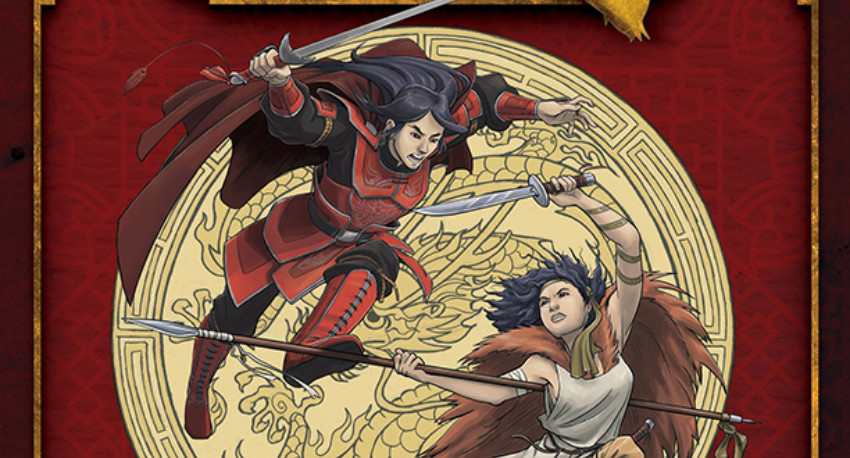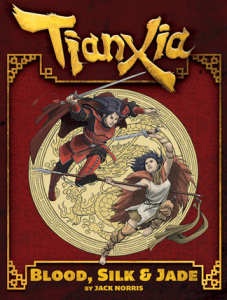 Did you love Crouching Tiger, Hidden Dragon, or are Bruce Lee movies more your speed? Either way, Jack Norris’s Tianxia will win you over. Tianxia (Vigilance Press) is a Fate-powered tabletop fantasy roleplaying game based on the wuxia sub-genre of martial arts adventure. (Norris’s cited inspirations include Chinese classics like Outlaws of the Water Margin, the manhua comic series Fung Wan (Storm Riders), a long list of Hong Kong films, and video games such as BioWare’s Jade Empire.) In wuxia (Chinese, “wandering warrior”) the main characters aren’t just master fighters. They’re nearly superhuman, able to carve mountains with their fists and, with a good running start, leap canyons. Tianxia combines wuxia and elements of more down-to-earth kung fu stories, playing to one of Fate’s strengths: taking heroes with unbelievable powers and grounding them in mundane life.
Did you love Crouching Tiger, Hidden Dragon, or are Bruce Lee movies more your speed? Either way, Jack Norris’s Tianxia will win you over. Tianxia (Vigilance Press) is a Fate-powered tabletop fantasy roleplaying game based on the wuxia sub-genre of martial arts adventure. (Norris’s cited inspirations include Chinese classics like Outlaws of the Water Margin, the manhua comic series Fung Wan (Storm Riders), a long list of Hong Kong films, and video games such as BioWare’s Jade Empire.) In wuxia (Chinese, “wandering warrior”) the main characters aren’t just master fighters. They’re nearly superhuman, able to carve mountains with their fists and, with a good running start, leap canyons. Tianxia combines wuxia and elements of more down-to-earth kung fu stories, playing to one of Fate’s strengths: taking heroes with unbelievable powers and grounding them in mundane life.
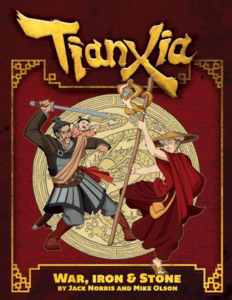 The Tianxia rulebook assumes you’ve already read Fate Core, so it spends most of its 192 pages on setting, a long list of antagonists, and the martial styles characters can master. The setting is Shénzhōu, a fantasy land with the timeless trappings of mythic China. The campaign’s default area is the wide and well-populated province of Jiāngzhōu. Much action takes place in the capital city of Băo Jiāng, with its restaurants, markets, and playhouses that boast great Aspects like “Out of the Way Corners” and “Strong Plum Wine.” Characters like Fish-Eye Cheng, leader of the Blue Carp Brotherhood, and Heartless Ai, the brokenhearted ex-assassin, are sure to make an impression — maybe a fist-shaped impression. Antagonists include Evil Eunuchs and White Widow Enforcers, as well as eight varieties of Dangerous Mobs. The Fierce Creatures bestiary includes rules for animals as player characters.
The Tianxia rulebook assumes you’ve already read Fate Core, so it spends most of its 192 pages on setting, a long list of antagonists, and the martial styles characters can master. The setting is Shénzhōu, a fantasy land with the timeless trappings of mythic China. The campaign’s default area is the wide and well-populated province of Jiāngzhōu. Much action takes place in the capital city of Băo Jiāng, with its restaurants, markets, and playhouses that boast great Aspects like “Out of the Way Corners” and “Strong Plum Wine.” Characters like Fish-Eye Cheng, leader of the Blue Carp Brotherhood, and Heartless Ai, the brokenhearted ex-assassin, are sure to make an impression — maybe a fist-shaped impression. Antagonists include Evil Eunuchs and White Widow Enforcers, as well as eight varieties of Dangerous Mobs. The Fierce Creatures bestiary includes rules for animals as player characters.
Martial artists can choose from 36 unique styles or create their own. Each style has an associated Form with strengths and weaknesses that can be invoked or compelled. Besides the techniques associated with Forms, there are also “Lost Techniques” like Drunken Immortal, Feast of the Golden Vampire, and Mountain-Shattering Shout. Obtaining such a powerful technique can be a quest in itself.
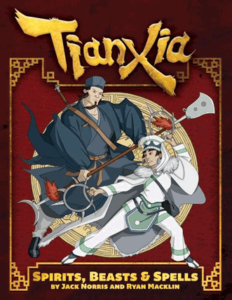 Tianxia makes a few minor rules adjustments to out-of-the-box Fate. It adds one new skill, Chi, the mastery of internal energies. Use Chi to enhance focus, become more resilient against attacks or heal faster, or power kung fu moves. The Jianghu scale ranks characters based on how much kung fu they know; each rank represents a significant rise in power. For instance, higher-ranked characters can move faster and can’t be the target of Teamwork from lower-level opponents.
Tianxia makes a few minor rules adjustments to out-of-the-box Fate. It adds one new skill, Chi, the mastery of internal energies. Use Chi to enhance focus, become more resilient against attacks or heal faster, or power kung fu moves. The Jianghu scale ranks characters based on how much kung fu they know; each rank represents a significant rise in power. For instance, higher-ranked characters can move faster and can’t be the target of Teamwork from lower-level opponents.
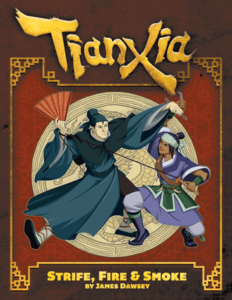 Like any Fate game, Tianxia is meant to be customized. Norris provides many ideas, from bonuses at character creation to Shén attitudes towards gender and sexuality. The GM’s section in particular contains Campaign Aspects and other play options that let you distinguish your own Tianxia campaign from any other. You can get started with any of four promising campaign/adventure seeds and an “adventure menu” of mix-and-match story ideas.
Like any Fate game, Tianxia is meant to be customized. Norris provides many ideas, from bonuses at character creation to Shén attitudes towards gender and sexuality. The GM’s section in particular contains Campaign Aspects and other play options that let you distinguish your own Tianxia campaign from any other. You can get started with any of four promising campaign/adventure seeds and an “adventure menu” of mix-and-match story ideas.
Tianxia: Blood, Silk & Jade will please Hong Kong film buffs, Chinese history lovers, fans of the Dynasty Warriors video games, and anyone hungry for out-of-control Fate action.
